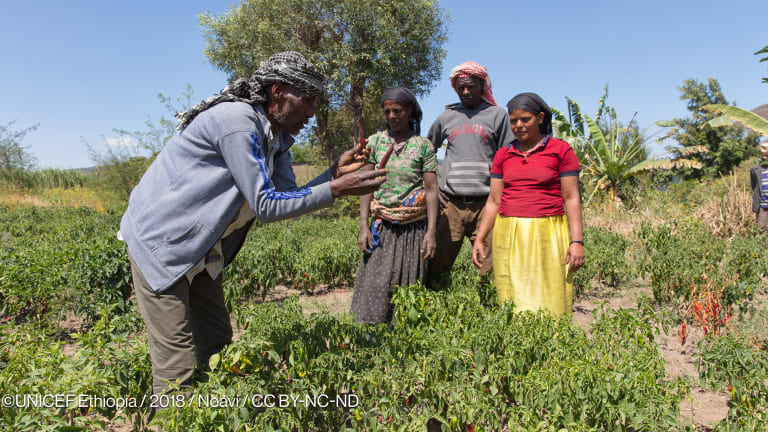
Since 2006, Africa has been nursing an ambition of revolutionizing the continent's agricultural sector spearheaded by AGRA.
But earlier this month AGRA — which was formerly known as the Alliance for Green Revolution in Africa — announced that it would be dropping the Green Revolution from its name and evolving its approach toward an inclusive and sustainable food systems transformation in Africa as part of its new five-year strategy.
Hailemariam Desalegn, AGRA’s board chair, said the increased frequency and intensity of climate calamities prompted the organization to expand its work in sustainable farming in order to help farmers and communities to build resilience.
“We have tried to address [a] uniquely African Green Revolution for the last couple of decades,” he said. “But now we need to go for a sustainable farming because the climate shocks are becoming more pronounced. And we need to address that.”
Founded with the main goal of establishing an inclusive and sustainable transformation that would change smallholder farming into a highly productive, efficient, and competitive system, AGRA had an ambition of doubling the productivity and incomes of 30 million small-scale farming households while reducing food insecurity by half in 11 countries by the year 2021.
But in a response to an independent evaluation of its activities, AGRA said farmers across the continent have instead experienced declining yields due to external shocks.
"Climate change has brought drought, extreme weather events, and degraded land but also unforeseen hazards, such as Fall Army Worm and Locusts. These external shocks have been magnified by COVID-19 over the past two years, which impacted agricultural SMEs especially those in markets in many unexpected ways. The combination of all these challenges has contributed to an increase in food insecurity across Africa," the response stated.
During a visit to Malawi, Desalegn said in the wake of climate change, there was a need to come up with solutions that could cushion farmers.
"We need to have crop insurance with the climate crisis,” he said. “Our next strategy is to develop climate adaptive seeds and crops because with the early or late coming of rain farmers need to have challenges in selecting the right seed.”
AGRA aims to work with 28 million farmers in 15 countries to develop sustainable food systems through access to affordable, productive, climate, and pest-resistant seeds. The new strategy aims to get 40% of the targeted farmers to adopt improved varieties including climate-smart and nutrient-dense varieties, and to get 30% of targeted farmers to adopt sustainable farming practices that protect the environment.
In line with this, the organization announced a partnership with seed manufacturer CGIAR to develop and provide farmers with early-maturing, drought-tolerant, and multiple disease-resistant seeds and crop varieties to enable the farmers to cope and adapt to the changing climate patterns.
Dyborn Chibonga, AGRA’s regional head for Malawi and Mozambique, said that under the new strategy, the organization will also continue to support farmers with extension services that promote the adoption of climate-smart agricultural practices in a bid to enhance resilience and environmental protection.
"Subsistence farmers are vulnerable to climate shocks, under the new strategy, AGRA will work towards promoting climate-resilient farming practices such as irrigation farming and use of early maturing crop varieties,” Chibonga said.
According to World Bank data, nearly 80% of Malawi’s population is employed in the agriculture sector. But in southern Malawi for instance, unpredictable weather patterns have, in recent years, resulted in prolonged dry spells and severe floods making it difficult for farmers to harvest enough food.
Stella Nkhoma, a 35-year-old farmer from Neno district in southern Malawi who has previously tried planting hybrid seeds, said that while farmers are adopting climate-smart agricultural practices including conservation agriculture, they are still affected by climate conditions.
“I have been planting hybrid maize which matures earlier than our local breeds, but it doesn’t withstand the hostile weather,” Nkhoma said.
William Chadza, executive director of Mwapata Institute — an independent agricultural policy think tank that closely works with AGRA on some of its initiatives, said as climate change continues to take its toll, there is also a need for a shift from rainfed farming to irrigation farming to consistently produce crops throughout the year without fear of dry spells or floods.
"The challenge is that most of the production is reliant on smallholder farms which mainly rely on rain-fed production as such any disruption in the rain pattern either a shortage or surplus rains production is affected," Chadza said.
Under the new strategy, AGRA is promoting the expansion of small-scale irrigation by improving market opportunities, energy for water lifting, and access to irrigation water, including from shallow wells and groundwater.









